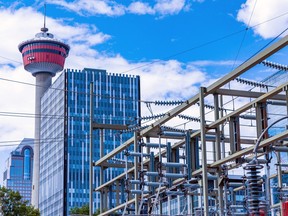The city has set next year’s franchise fee rate at $0.015507 (about 1.5 cents) per kilowatt-hour, for both residential and commercial customers

With the city’s new “quantity-only” model for collecting local access fees (LAFs) that are tacked onto monthly power bills set to be implemented in January, city council voted this week to move forward on the plan.
Late Tuesday evening, council voted to proceed with a new agreement between the city and Enmax, with the next step being to submit an application to the Alberta Utilities Commission (AUC) later this month. The agreement includes a new LAF rate for electricity and an updated calculation method the city claims will make the fee more stable and transparent.
Also known as franchise fees, LAFs are paid in lieu of property taxes by energy providers to access municipal electricity distribution infrastructure. The providers then pass the fees on to ratepayers and include it as a portion of their monthly power bills.
The city has set its 2025 franchise fee rate at $0.015507 (about 1.5 cents) per kilowatt-hour for both residential and commercial customers. According to a Wednesday news release, the rate is expected to generate $143.5 million in revenue next year — a $36.7-million decrease from the existing calculation method that tied a portion of the rate to the province’s default wholesale electricity price, now called the Rate of Last Resort.
Budgeting for this amount “minimizes the risk of collecting more or less than is needed and provides stable, predictable revenue to fund services,” the city stated.
“We’ve heard from council and Calgarians about the importance of affordable and predictable energy bills,” Carla Male, the city’s chief financial officer, said in the news release. “We’ve designed the new franchise fee, the only charge that is set and collected by the city, to be simpler and clearer to understand — a fixed amount per kilowatt-hour instead of a complicated formula tied to unpredictable energy rates.”
The change is expected to decrease the average residential consumer’s franchise fees by about 30 per cent next year, according to the city, which added the new rate will result in an average monthly cost of $7.91 in 2025, down from an estimated $11.24 per month in 2024.
Sheldon Fulton, a Calgary-based independent energy consultant, said the quantity-only model is an improvement from the status quo, but he wants the city to justify how the LAF rate was determined, noting 1.5 cents per kilowatt-hour is still 50 per cent higher than the rate Edmonton uses.
The calculation of the annual rate needs to have greater transparency and should be subject to a third-party review, ideally from the AUC, Fulton argued.
“It’s better than what we had, but it’s not as good as what it could or should be, relative to consumers,” he said.
“The piece that’s still missing is, where did they get that 1.5 cents from? And what’s the factor they’re going to use each year with respect to it?”
Coun. Andre Chabot, who was a staunch supporter of the status quo, said the city was compelled to come up with a new LAF model when the Alberta government earlier this year tabled Bill 19, the Utilities Affordability Statutes Amendment Act. The legislation intends to standardize how municipalities are allowed to calculate franchise fees on electricity bills, to prevent volatile spikes in power prices, such as Calgary experienced in the summer of 2023.
“It’s kind of been forced upon us to use a different methodology,” Chabot said. “Ultimately, it’s going to provide greater predictability for the City of Calgary, but it’s also going to be a fixed rate that will be ever increasing.”

With new generation having recently come on board, Chabot noted the price of electricity is currently quite low and Calgary’s franchise fee would have gone down as a result.
“The way the system was structured before, while we did have windfalls in times of high electricity prices, we also had a significant drop in our franchise fee when the price of electricity was low,” he said.
Following council’s vote this week, Enmax will apply to the AUC for approval of the new agreement (including the franchise fee rate) by Sept. 27.
Before that, the city will hold a public notice period until Sept. 24 to gather feedback from Calgarians about the proposed change. Feedback from this engagement will be included as part of the application to the AUC.